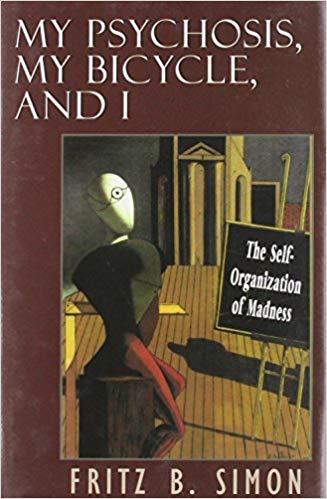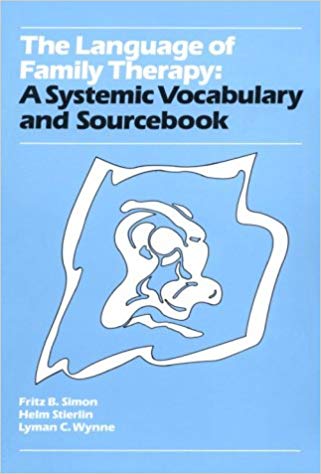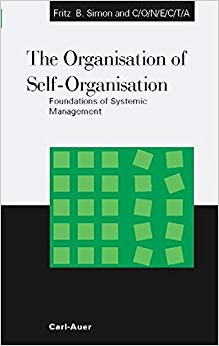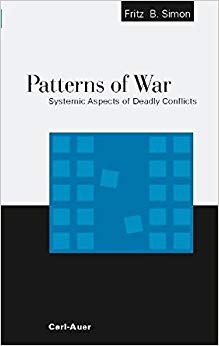Background
Fritz Bernhard Simon was born on October 27, 1948, in Siegen, Germany. He is the son of Rolf Udo and Kate Simon.







(You have to think logically to become mad. Whoever looks ...)
You have to think logically to become mad. Whoever looks for unambiguous truth or meaning gets into trouble and psychological turmoil. The evolution of logical thinking, as well as chaotic thinking, is determined by social interaction and communication rules. If one tries to communicate unambiguously, one generates ambiguity; if one tries to control the meaning of behavior, one generates madness. Like many human attributes, most so-called psychotic symptoms can be seen not as deficits, but as resources to keep alive a specific kind of communication and relationship. Integrating the current approaches of communication theory, chaos theory, and the theory of observing systems, Fritz B. Simon provides a new model, examining the self-organization and function of personal realities that we may call delusions and the delusions that we may call reality. This constructionist view of subjectivities, including madness, dissolves the either/or distinction between the highly ideological positions that either the family or the patient, either the biological or the psychic process, is guilty of producing psychosis. It also blurs the either/or distinction between so-called psychotic and normal existences. This book is an entertaining, informative, surprising, and humorous introduction to the newer approaches of systems thinking. It shows in a very logical way that logical thinking may be bad for your mental health.
http://www.amazon.com/gp/product/1568216475/?tag=2022091-20
1977

(The authors offer integrated and critical reviews of basi...)
The authors offer integrated and critical reviews of basic family therapy concepts and data from various systems sciences, such as communication theory, information theory, and cybernetics, as well as linguistics, semiotics, and psychoanalysis.
http://www.amazon.com/gp/product/0961551909/?tag=2022091-20
1985

(Economics, so they say, is eighty per cent psychology. In...)
Economics, so they say, is eighty per cent psychology. In this book, the author shows that psychology is one hundred per cent economics. Every human interaction can be understood as a form of market economy. The theoretical explanation for this model follows from recent developments in systems and evolution theory and the epistemological concepts of so-called “radical constructivism”. Human behaviour can be seen as a commodity that is differentiated, named, evaluated and exchanged, and that means that anyone who acts, transacts. This book elucidates what this means in theory and practice for a manager and his everyday life, the organisation of companies, management, achievement, planning and business culture; the author illustrates this in a number of case examples and complements it with recipes for a manager’s everyday life.
http://www.amazon.com/gp/product/3896704478/?tag=2022091-20
2004

(Not a day goes by without news of conflicts in our immedi...)
Not a day goes by without news of conflicts in our immediate vicinity or further afield, conflicts which can only aptly be called war. War can be understood as a conflict in which the parties concerned risk their survival. This is not only valid for conflicts between nations, but also for other social units such as companies, organisations, tribes, gangs etc., and even for individuals. Examples are duels or conflicts between married couples ending in murder and manslaughter. In this book, Fritz Simon analyses the developmental conditions for war from the perspective of systems theory. The author covers biological and psycho-analytical models as well as sociological findings. The result is that, in general, these conflicts are not about economic or impulse-driven interests, but seem to be about such antiquated values as honour, pride and status. In the author’s opinion, then, wars should be understood as a continuation of sport with other means and, a fact we should not ignore, as the ultimate form of entertainment – at least for observers who are not directly affected. September 11, 2001 and subsequent reactions have proved to be the example for the book, published shortly before. With fascination and horror, we discover that what followed was the war that followed this book to a "T". The analysis of developments from the attack on the Twin Towers to the war against Iraq, which has been added to this new edition, confirms the logic of deadly conflict demonstrated in this book.
http://www.amazon.com/gp/product/389670446X/?tag=2022091-20
2004
educator psychiatrist publisher scientist author
Fritz Bernhard Simon was born on October 27, 1948, in Siegen, Germany. He is the son of Rolf Udo and Kate Simon.
Simon studied medicine and sociology and was training as a psychiatrist and psychoanalyst from 1967 till 1982. He graduated from the University of Goettingen and obtained a Doctor of Medicine degree from it.
Simon started his career as a senior physician of the Department of Psychoanalytic Basic Research and Family Therapy of the University of Heidelberg in 1982. He worked there for seven years until he co-founded with G. Weber the Carl-Auer publishing house. In 1995, Simon co-founded the German-Chinese Academy of Psychotherapy, where he held the position of vice-president till 2005. During that time he was also a publisher of the magazine Family Dynamics and professor of the Faculty of Economic Sciences at the University of Witten.
In 2001, he created with G. Weber his new organization Simon, Weber and Friends Systemic Organizational Consulting GmbH, where he worked as a private psychiatrist till 2006. Since that year, Simon works as a scientific director of the Distance And Independent Studies Center at the University of Kaiserslautern.
Fritz Simon is best known as a specialist in the field of family psychiatry, who worked as a group dynamic trainer, psychotherapist and psychiatrist in various institutions. He is the author and publisher of about 240 articles and 28 books, including My psychosis, my bike and me, Differences that make differences, Deadly conflicts, The family of the family business, Survival tips for adoptive parents, Introduction to systemic economic theory and many others.
(The authors offer integrated and critical reviews of basi...)
1985(Not a day goes by without news of conflicts in our immedi...)
2004(Economics, so they say, is eighty per cent psychology. In...)
2004(You have to think logically to become mad. Whoever looks ...)
1977Simon was a vice-president of the European Association for Family Therapy from 1994 till 2001.
Simon married Christel Rech on May 17, 1982. The couple has 2 children: Michelle and Preetha.
